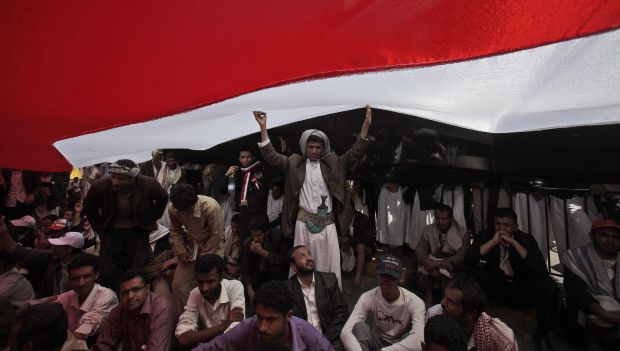Federalism is not necessarily the best choice for Yemen, nor is it necessarily the worst choice. It is certainly not a magic bullet, a catch-all solution to the plethora of social, economic, sectarian and political issues that plague the country. Whatever system of governance Yemen’s recent national dialogue conference chose, the country would have been in for a tough ride over the next few years. Federalism will succeed or fail because the country’s political transition has worked or it hasn’t, and not the other way around.
Yemen’s government, President Abd Rabbuh Mansur Hadi, and the international backers of Yemen’s political transition plan face an untold number of challenges over the next few years. They plan to draft a new constitution, to register millions of people to vote, to hold a referendum on the new constitution, and—if the referendum is successful—to follow up with as many as four different local and national elections. They will also have to tackle a growing financial crisis that threatens to plunge the country into economic and humanitarian disaster and find a way of managing the plethora of local conflicts and daily security threats. Only then will federalism itself be put to the test.
A draft of the new constitution is currently scheduled for completion by mid-July. But the drafting process will become a source of political tension once details are made public of how the committee in charge of writing it plans to divvy up political power and control of natural resources between central and regional units of government. Yemen’s political elite, who benefited greatly from the centralization of economic and political power under former president Ali Abdullah Saleh, are unlikely to be happy to see their interests eroded by the devolution of that power, and may well do their best to undermine the constitution-drafting process. Equally, though, groups from oil- and gas-rich areas that were marginalized by Saleh’s regime will be upset if they are not given a direct share in locally produced resources.
Referendums and elections have historically been flashpoints for crisis in weak, conflict-afflicted states like Yemen. Southern separatists, who in the main did not take part in the recent dialogue, are likely to boycott the voter registration process and will call into question the legitimacy of the each successive vote while intensifying their calls for secession. Al-Qaeda in the Arabian Peninsula (AQAP), the local franchise of the extremist Islamist group, will also take a keen interest in disrupting elections, and the country’s strongest political parties—the Saleh-founded General People’s Congress (GPC) and the Islamist Al-Islah—are unlikely to take unexpected losses at the polls well either.
Yemen may not even make it that far. The current transitional government, made up of a 50:50 split of the GPC and an opposition coalition led by Al-Islah, has struggled to rein in spending and supplement dwindling oil and gas revenues. Yemen will face a severe economic crisis unless the government either takes the politically unpopular step of cutting fuel subsidies or manages to convince one of Yemen’s oil-rich Gulf neighbors to step in with the cash needed to avert disaster. An economic crisis would stall, if not entirely derail, the slow march towards elections—as would fresh outbreaks of fighting between Yemen’s many armed groups.
These issues would have arisen irrespective of the model of government selected by delegates at the conference. Most political transitions have their shaky and unstable periods, as old systems are gradually dismantled and something new is built in its place. Elections in fragile states with divided populations almost always go hand-in-hand with conflict. Economic crises often follow periods of political instability.
Even if these obstacles can be overcome, there is no guarantee that federalism will be a success. Tensions between newly minted regional and local governments and the central administration in Sana’a, long used to ruling the roost, are inevitable. The country’s many economic issues will not disappear overnight, and handing control of resources to regional governments may create new inter-regional rivalries. Federalism may well catalyze, rather than prevent, Southern secession.
But Yemenis have suffered through so much that it would be in their best interests make the most of it. Federalism would represent, at long last, a clean break from the centralized autocracy of the Saleh era, an indelible rebalancing of power from the center to the periphery. In time, secessionists may even come to find that local autonomy is a good enough solution to their grievances.
Yemen does not face a choice between federalism and chaos. It faces a choice between seizing the opportunity to build something new and allowing past failures to dictate a miserable future.
The counterpoint to this article can be read here.
